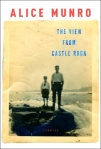 The literary world lost several of its favorite writers last week. I was dismayed to see that the news about Louis Auchincloss, despite his prolific output, was rather buried in the headlines. Ah, well. So it goes. Actually, I’ve never read anything by Auchincloss before, so when I was poking around looking for a good short story this weekend, I picked up my copy of Manhattan Monologues. Given his recent death and my recent reading of Edith Wharton (a writer to whom he is often compared), it seemed like a perfect fit. Would it be anticlimatic to say that I was rather disappointed in the story?
The literary world lost several of its favorite writers last week. I was dismayed to see that the news about Louis Auchincloss, despite his prolific output, was rather buried in the headlines. Ah, well. So it goes. Actually, I’ve never read anything by Auchincloss before, so when I was poking around looking for a good short story this weekend, I picked up my copy of Manhattan Monologues. Given his recent death and my recent reading of Edith Wharton (a writer to whom he is often compared), it seemed like a perfect fit. Would it be anticlimatic to say that I was rather disappointed in the story?
Unfortunately, I was. While the plot and the characters of All That May Become a Man were actually rather interesting, I found the writing style to be severley flat. The story concerns a young man, Ambrose, whose father was a wild, courageous, wealthy man. Ambrose grows up learning to idolize Teddy Roosevelt and to always put courage before personal feelings. As he grows older, though, Ambrose’s relationship with his father changes, and the story is really about Ambrose talking about that situation. Perhaps the “Monologues” part of the title was supposed to be taken very seriously, and that’s why I disliked the story so much. But the entire time, I felt like Ambrose was just telling things about his life instead of showing them.
I’m not going to give up on this collection yet, because the storytelling may improve. So far, it seems that Auchincloss may cover the same topics and people that Edith Wharton did, but he doesn’t do it nearly so elegantly. However, I did find this alternate review that seems to rather like the “monologue” style of writing. If you’ve never heard of or read Auchincloss before, this review is worth reading to get a different opinion.
In other bookish news, I finished Howards End last week. It was lovely and I miss the characters. I’ve nearly finished with Their Eyes Were Watching God, and I am surprised with how quickly it reads. What a great cast of characters.


 I can hardly believe this, but it took me three nights to read this short story. I read it for a few minutes every night before I went to sleep, but it took me three nights! Crazy.
I can hardly believe this, but it took me three nights to read this short story. I read it for a few minutes every night before I went to sleep, but it took me three nights! Crazy.


